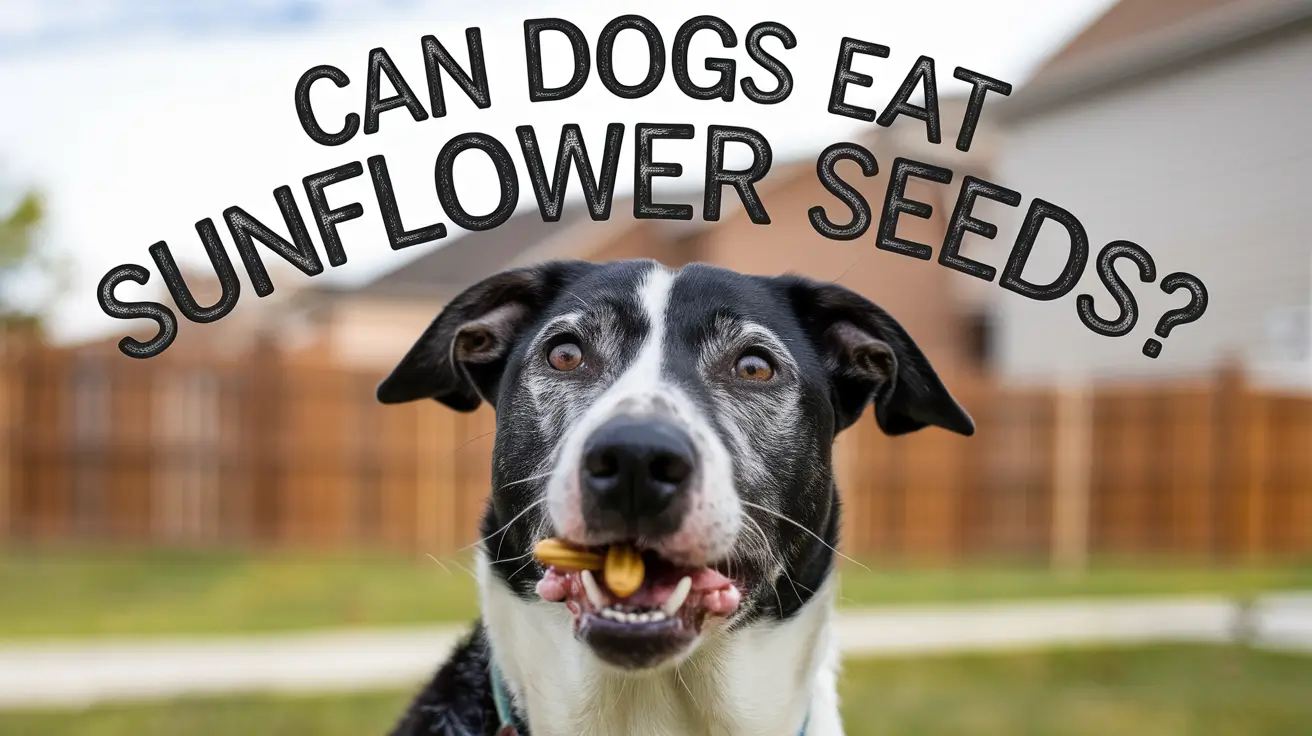Can Dogs Eat Sunflower Seeds? 6 Solid Reasons Dogs Eat Sunflower Kernels
When it comes to our furry companions, it’s natural to question the safety and benefits of the foods they consume. Sunflower seeds are a popular snack among humans, but Can dogs eat Sunflower seeds? Are Sunflower seed safe for dogs? Yes, dogs can eat sunflower seeds and sunflower seeds are safe in moderation, provided certain precautions are taken. These seeds can offer health benefits, as they are rich in vitamins, healthy fats, and antioxidants that support skin and coat health.
However, it’s essential to ensure the seeds are unsalted, unseasoned, and served without their shells to prevent choking hazards or digestive issues. Always offer sunflower seeds sparingly and consult your veterinarian if in doubt.

Table of Contents
- What Are Sunflower Seeds?
- Are Sunflower Seeds Good for Dogs
- Nutritional Benefits of Sunflower Seeds for Dogs
- How to Safely Feed Sunflower Seeds to Your Dog
- Are Sunflower Seeds Harmful to Dogs
- Can Dogs Eat Sunflower Kernels
- Signs of Sunflower Seed Overconsumption in Dogs
- Alternatives to Sunflower Seeds for Dogs
- Creative Ways to Incorporate Sunflower Seeds into Your Dog’s Diet
- Common Misconceptions About Sunflower Seeds and Dogs
- Understanding Your Dog’s Unique Dietary Needs
- How to Store Sunflower Seeds for Your Dog
- When to Avoid Feeding Sunflower Seeds to Dogs
- Exploring Other Dog-Friendly Seeds
- Key Takeaways for Dog Owners
- A Few Extra Tips for Feeding Sunflower Seeds to Dogs
- The Environmental Impact of Sunflower Seeds
- Long-Term Effects of Including Sunflower Seeds in a Dog’s Diet
- Understanding When to Seek Veterinary Guidance
- Exploring the Science Behind Sunflower Seeds for Dogs
- How Sunflower Seeds Compare to Other Dog Treats
- The Role of Sunflower Seeds in Canine Holistic Diets
- Sunflower Seeds and Sustainability in Pet Nutrition
- How to Tell If Your Dog Likes Sunflower Seeds
- Can Dogs Eat Sunflower Seeds with Shells
- The Safe Way to Serve Sunflower Seeds to Dogs
- Common Questions Asked Related to Can Dogs Eat Sunflower Seeds
- Benefits of Sunflower Oil for Dogs
- Final Takeaway: A Small Treat with Big Benefits
- Frequently Asked Questions About Sunflower Seeds and Dogs
What Are Sunflower Seeds?
Sunflower seeds are the edible seeds of the sunflower plant (Helianthus annuus). Encased in a hard shell, they are rich in nutrients, including healthy fats, vitamins, and minerals. While these seeds are a healthy snack for humans, the same cannot always be said for our canine companions.
Are Sunflower Seeds Good for Dogs
Yes, sunflower seeds are good for dogs when given in moderation and under specific conditions. However, there are several factors to consider before sharing them with your pup:
1. Unsalted and Plain Only
Dogs should only consume unsalted sunflower seeds. Salted seeds contain excessive sodium, which can lead to dehydration or sodium ion poisoning.
2. Shell-Free Seeds
The shells of sunflower seeds are tough and can pose a choking hazard or lead to digestive blockages. Always offer shelled seeds to your dog.
3. Quantity Control
Overfeeding sunflower seeds can result in weight gain or gastrointestinal upset due to their high fat content. Moderation is key.
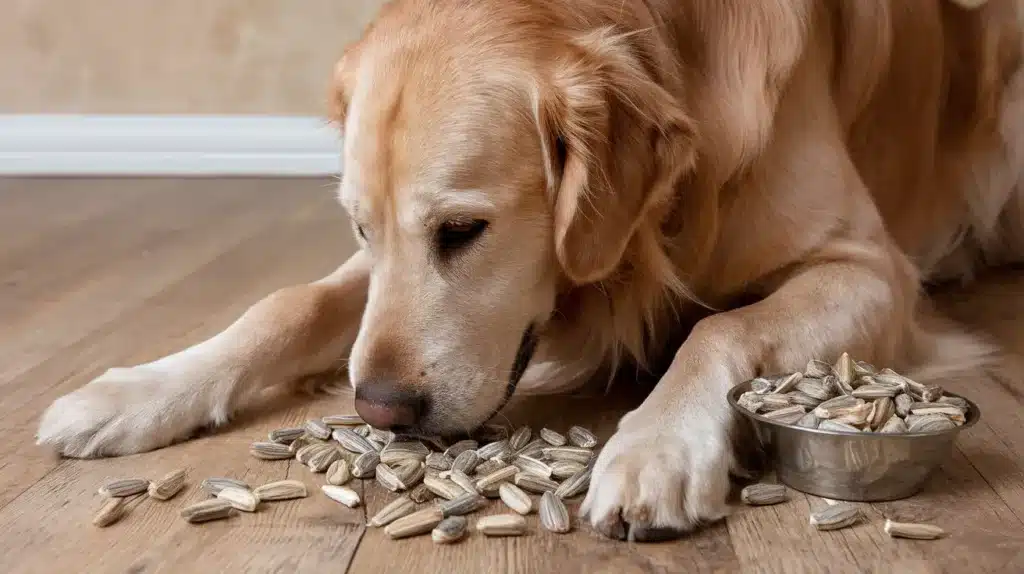
Nutritional Benefits of Sunflower Seeds for Dogs
When offered appropriately, sunflower seeds can provide several nutritional benefits for dogs:
- Rich in Healthy Fats
Sunflower seeds contain omega-6 fatty acids, which promote a healthy coat and skin. - Packed with Vitamins
They are a good source of vitamin E, an essential antioxidant that supports the immune system and overall health. - Mineral-Rich
Sunflower seeds provide magnesium and selenium, which contribute to bone health and cellular functions.
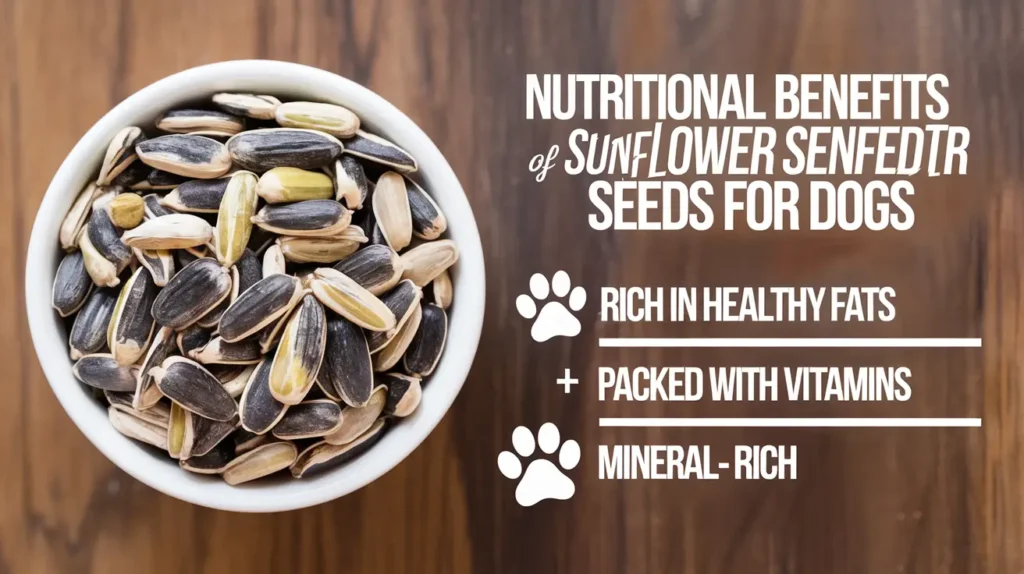
How to Safely Feed Sunflower Seeds to Your Dog
To ensure your dog enjoys sunflower seeds without any health risks, follow these guidelines:
- Choose the Right Type
Only offer unsalted, plain, and shelled sunflower seeds. Avoid flavored or processed varieties. - Monitor Portions
Limit sunflower seeds to an occasional treat, not exceeding 1 teaspoon for small dogs or 1 tablespoon for larger breeds. - Observe for Allergies
Introduce sunflower seeds gradually and monitor for any allergic reactions, such as itching, vomiting, or diarrhea. - Serve as a Topping
Sprinkle a small amount of sunflower seeds over your dog’s regular food for an added nutritional boost.
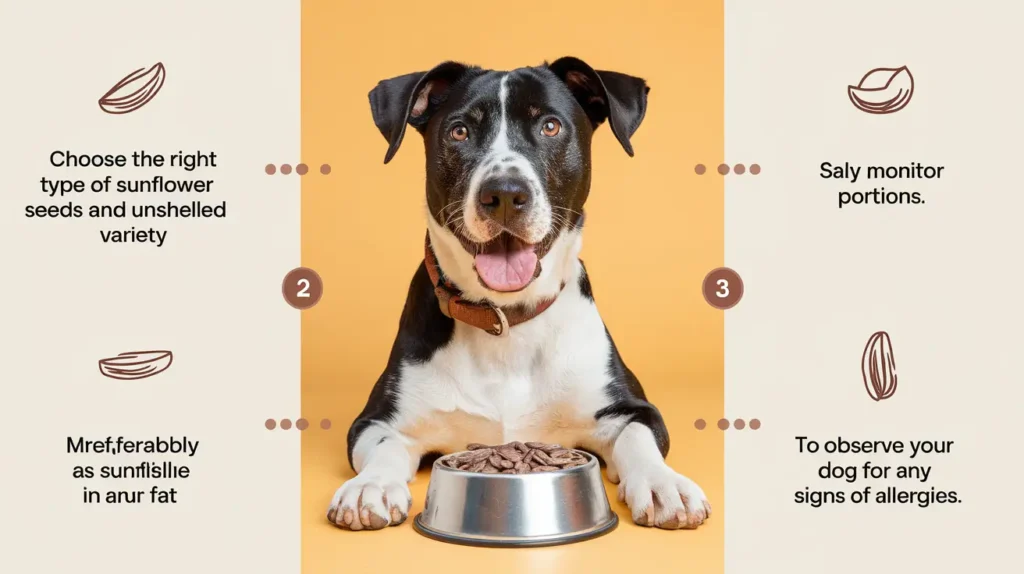
Are Sunflower Seeds Harmful to Dogs
While sunflower seeds can be beneficial, there are potential risks if not prepared or served correctly:
- Digestive Issues
Consuming seeds with shells can lead to blockages or irritation in the digestive tract. - Caloric Intake
The high-fat content can contribute to obesity if fed in excess. - Salt Toxicity
Sunflower seeds seasoned with salt can be harmful, leading to conditions like sodium poisoning.
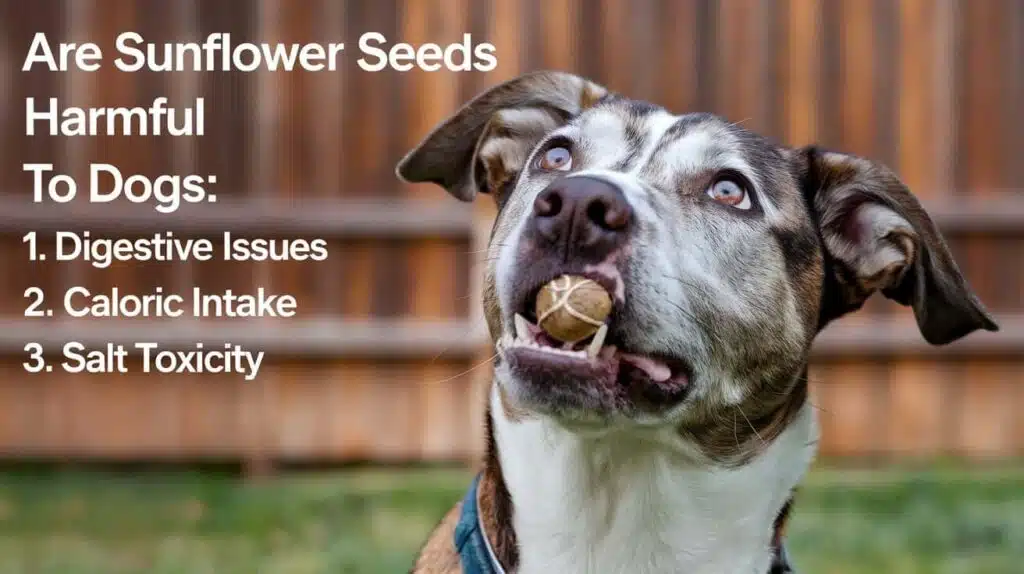
Can Dogs Eat Sunflower Kernels
Yes, dogs can eat sunflower kernels, but certain precautions are necessary:
- Unsalted and Plain: Ensure the kernels are unsalted and unseasoned, as excess sodium can harm dogs.
- Shell-Free: Remove the shells, as they can cause choking or digestive issues.
- Moderation: Feed sunflower kernels only in small amounts to avoid weight gain or stomach upset.
- Nutritional Benefits: They provide healthy fats, vitamins (like Vitamin E), and antioxidants that support skin and coat health.
- Avoid Overfeeding: Too many kernels can lead to obesity or pancreatitis due to their fat content.
- Consult a Vet: Always check with your veterinarian before adding new foods to your dog’s diet.

Signs of Sunflower Seed Overconsumption in Dogs
If your dog accidentally consumes too many sunflower seeds, watch for these symptoms:
- Vomiting or diarrhea
- Lethargy or weakness
- Increased thirst or urination
- Abdominal pain
If any of these symptoms occur, consult your veterinarian immediately.
Alternatives to Sunflower Seeds for Dogs
If you’re hesitant about giving sunflower seeds to your dog, consider these healthy alternatives:
- Pumpkin Seeds
Rich in fiber and antioxidants, pumpkin seeds are an excellent option when served unsalted and plain. - Carrots
Low in calories and high in vitamins, carrots are a crunchy treat most dogs love. - Apples (Seed-Free)
Apples provide natural sweetness and essential nutrients, but always remove the seeds, as they contain cyanide.
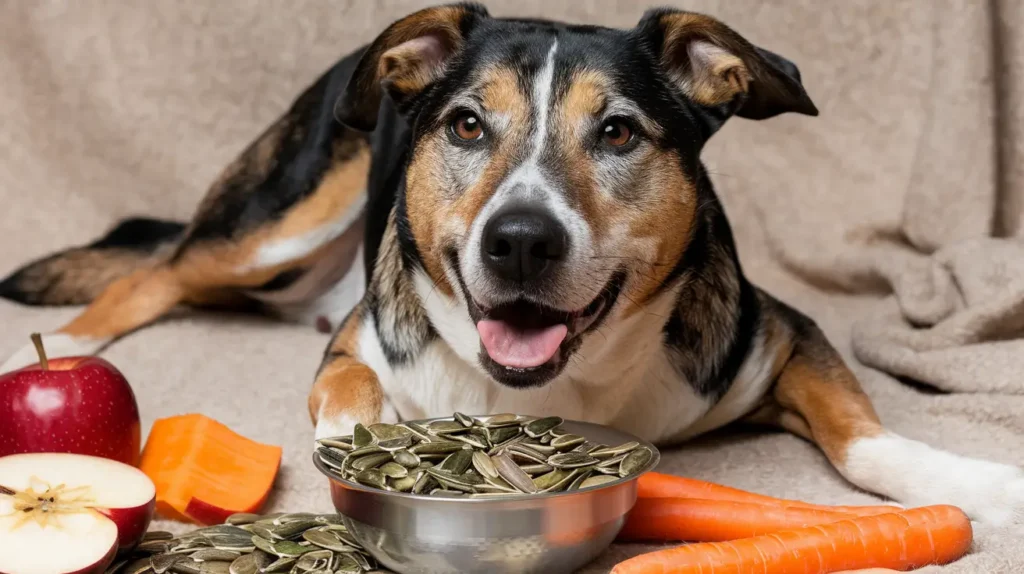
Creative Ways to Incorporate Sunflower Seeds into Your Dog’s Diet
If your veterinarian has given the green light for sunflower seeds, here are a few creative ways to include them in your dog’s diet:
1. Homemade Sunflower Seed Treats
Combine sunflower seeds with dog-safe ingredients like peanut butter (unsalted and xylitol-free), oat flour, and a splash of water to create homemade dog biscuits. Bake at a low temperature until firm for a tasty snack your dog will enjoy.
2. Sprinkle Over Meals
Crush sunflower seeds and sprinkle them over your dog’s regular food. This works particularly well for picky eaters, as it adds a nutty aroma and flavor they may find appealing.
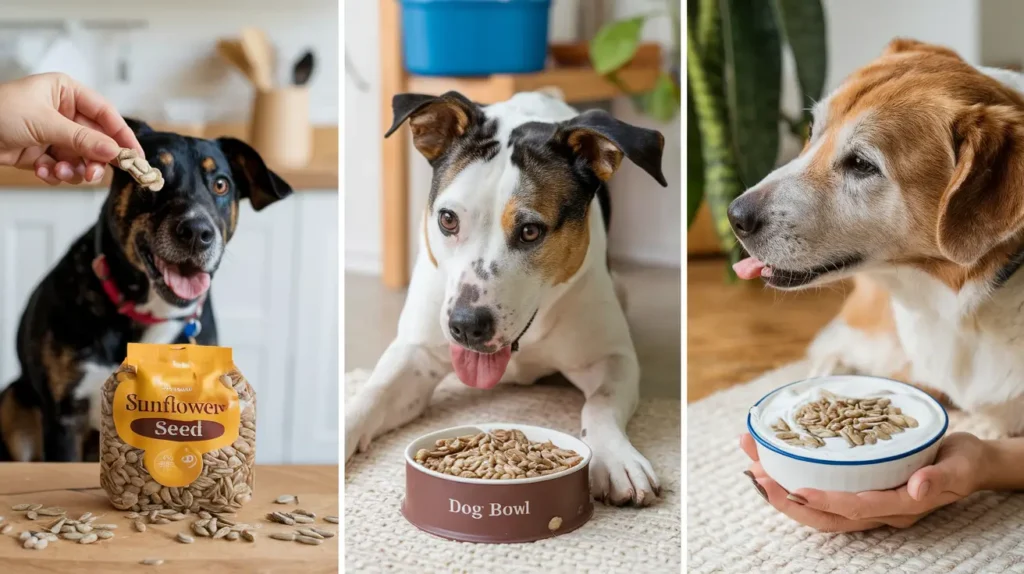
3. Mix Into Yogurt
Stir a small number of sunflower seeds into plain, unsweetened yogurt as a refreshing treat on hot days. This combination is rich in probiotics and healthy fats, benefiting your dog’s digestion and coat health.
4. Incorporate Into Training Treats
Use sunflower seeds as a training reward by mixing them with your dog’s favorite treats. Ensure they are in small, manageable portions to avoid overfeeding.
Common Misconceptions About Sunflower Seeds and Dogs
Myth 1: All Nuts and Seeds Are Dangerous for Dogs
While some nuts (like macadamia nuts) are toxic to dogs, sunflower seeds are not inherently harmful when served properly. However, the key lies in moderation and preparation.
Myth 2: Dogs Can Digest Sunflower Seed Shells
It’s a common belief that dogs can handle shells as they do bones. In reality, sunflower seed shells are indigestible and can cause intestinal blockages, making it crucial to remove them.
Myth 3: Sunflower Seeds Are Just Empty Calories
Sunflower seeds, when served correctly, provide essential nutrients that can complement a balanced canine diet. They are far from empty calories when used in moderation.
Understanding Your Dog’s Unique Dietary Needs
Every dog is different, and their dietary requirements can vary based on their age, breed, size, and health conditions. For instance:
- Puppies may need fewer treats overall to avoid overloading their developing digestive systems.
- Senior Dogs might benefit from the vitamin E in sunflower seeds, as it can support joint health and reduce inflammation.
- Active Breeds with higher energy needs might tolerate slightly larger portions of sunflower seeds due to their metabolism.

When in doubt, tailor any treat—including sunflower seeds—to your dog’s specific needs and activity levels.
How to Store Sunflower Seeds for Your Dog
Proper storage ensures the seeds remain fresh and safe for consumption:
- Keep in Airtight Containers: Exposure to air can lead to rancidity, which diminishes the seeds’ nutritional value and may upset your dog’s stomach.
- Store in a Cool, Dry Place: Heat and moisture can spoil the seeds or encourage mold growth.
- Check for Expiration: Always ensure the seeds are within their expiration date and free of any off smells or discoloration.
When to Avoid Feeding Sunflower Seeds to Dogs
There are certain situations where sunflower seeds may not be appropriate for your dog:
- Allergies or Sensitivities: If your dog exhibits signs of food allergies, such as itchy skin or gastrointestinal upset, discontinue feeding them sunflower seeds.
- Preexisting Health Conditions: Dogs with conditions like pancreatitis or obesity may not tolerate the high-fat content of sunflower seeds.
- Ingestion of Flavored Seeds: If your dog consumes flavored or salted sunflower seeds accidentally, monitor them for symptoms and consult your vet if necessary.
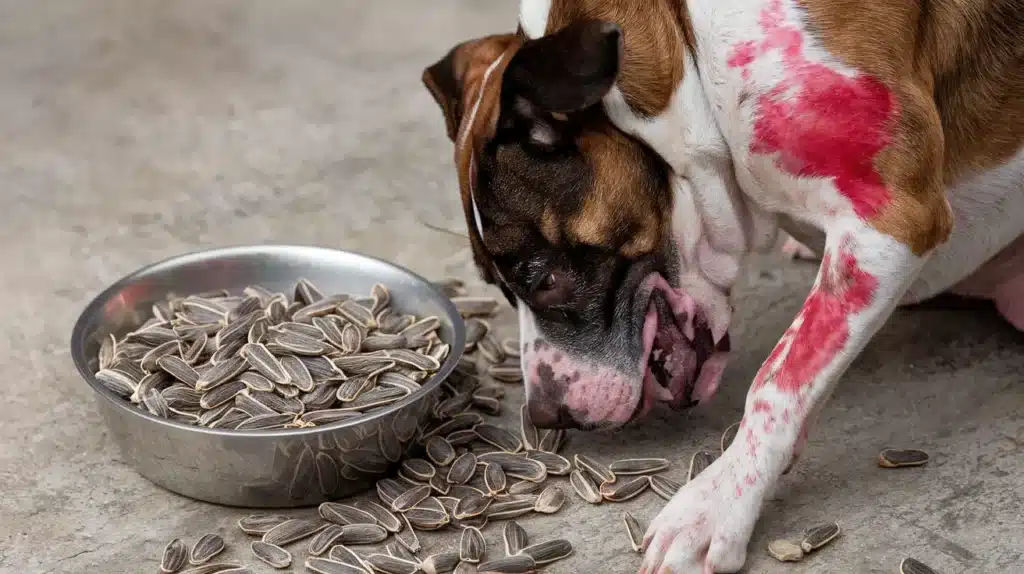
Exploring Other Dog-Friendly Seeds
While sunflower seeds can be a great treat, there are other seeds that offer nutritional benefits for dogs:
1. Flaxseeds
Rich in omega-3 fatty acids and fiber, flaxseeds can support digestion and coat health. Always grind flax seeds before serving to improve digestibility.
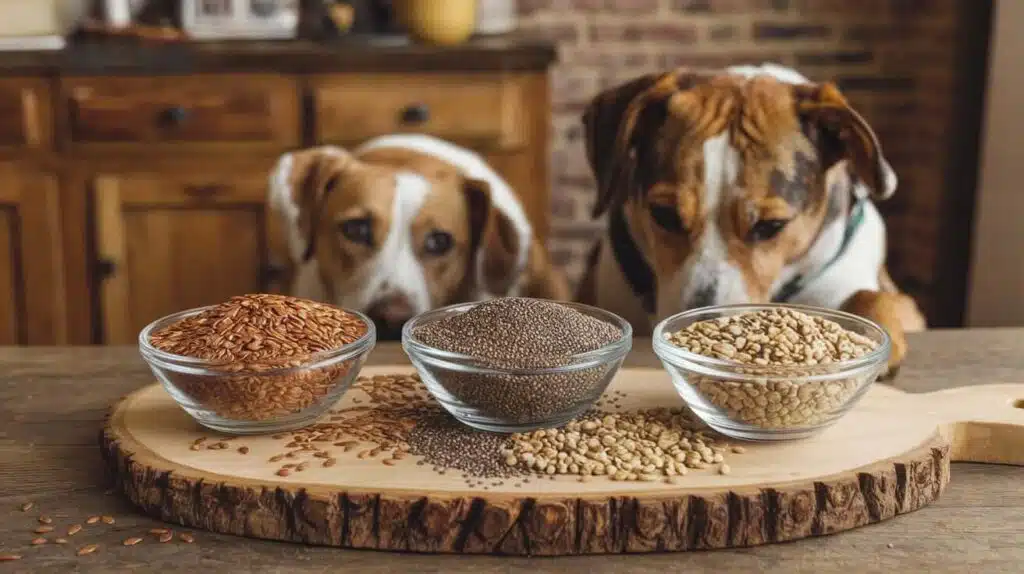
2. Chia Seeds
These tiny seeds are packed with omega-3s, calcium, and antioxidants. They can be soaked in water and mixed with your dog’s food for easy consumption.
3. Hemp Seeds
Hemp seeds are a powerhouse of protein and fatty acids. They are safe for dogs and can promote healthy skin, joints, and overall energy levels.
Key Takeaways for Dog Owners
- Sunflower seeds are safe for dogs if they are unsalted, shell-free, and served in moderation.
- Always consult your veterinarian before introducing any new food to your dog’s diet, especially if they have preexisting health conditions.
- Treats like sunflower seeds should complement a balanced diet, not replace essential meals.
Providing occasional treats, such as sunflower seeds, is a wonderful way to bond with your dog while supporting their nutritional needs. When done correctly, these small additions can make a big difference in their overall health and happiness.
A Few Extra Tips for Feeding Sunflower Seeds to Dogs
To ensure your dog gets the best from sunflower seeds while avoiding any potential risks, here are some extra tips to keep in mind:
1. Combine with Other Healthy Foods
Sunflower seeds can be mixed with other dog-friendly foods for added nutrition. For example, mix crushed sunflower seeds with cooked sweet potatoes or plain, steamed vegetables for a nutrient-packed snack.
2. Avoid Feeding Sunflower Seed Products Made for Humans
Many sunflower seed-based snacks and spreads contain sugar, salt, or harmful additives like xylitol, which is toxic to dogs. Always stick to plain, natural options.

3. Use as an Occasional Reward
Instead of making sunflower seeds a regular treat, use them sparingly as a reward during training sessions or as a special snack on occasion. This approach prevents overconsumption and keeps them as an exciting novelty for your dog.
4. Educate Family Members
Make sure everyone in your household is aware of how to safely feed sunflower seeds to your dog. This will prevent accidents like giving seeds with shells or overfeeding.
The Environmental Impact of Sunflower Seeds
While sunflower seeds can be a healthy treat for dogs, they also carry environmental considerations. Purchasing organic and sustainably sourced sunflower seeds ensures that you’re making an eco-friendly choice. This not only benefits your pet but also supports responsible farming practices.
Long-Term Effects of Including Sunflower Seeds in a Dog’s Diet
Over the long term, incorporating small amounts of sunflower seeds into your dog’s diet may yield noticeable benefits, such as:
- Improved Skin and Coat Health
Regular consumption of omega-6 fatty acids can result in softer, shinier fur and reduced skin dryness. - Enhanced Immunity
The antioxidants in sunflower seeds, particularly vitamin E, can help protect your dog from free radicals and strengthen their immune system. - Balanced Energy Levels
The nutrients in sunflower seeds, when paired with a balanced diet, may contribute to consistent energy levels, particularly in active breeds.

However, overfeeding or improper preparation can lead to negative outcomes, such as weight gain or digestive upset. Always aim for balance and moderation.
Understanding When to Seek Veterinary Guidance
If you’re ever uncertain about whether sunflower seeds—or any new food—are suitable for your dog, don’t hesitate to consult a veterinarian. Professional advice can help you make informed decisions tailored to your dog’s unique needs. Some specific instances where you should seek veterinary guidance include:
- Chronic health conditions: Dogs with pancreatitis, kidney issues, or obesity may require strict dietary restrictions.
- Unusual symptoms: If your dog displays signs of allergies, gastrointestinal upset, or other concerning reactions after eating sunflower seeds, a veterinarian can provide a proper diagnosis and treatment plan.
- Dietary adjustments: If you’re looking to introduce several new foods into your dog’s diet, a vet can help structure a balanced plan.
Exploring the Science Behind Sunflower Seeds for Dogs
The health benefits of sunflower seeds are well-documented for humans, but their potential for dogs is also backed by science. Here’s a deeper look at the specific nutrients found in sunflower seeds and how they impact canine health:
1. Vitamin E
Vitamin E is a powerful antioxidant that protects cells from oxidative stress. For dogs, this translates to:
- Enhanced immune system function.
- Protection against aging-related diseases.
- Improved cardiovascular health.
2. Omega-6 Fatty Acids
Sunflower seeds are a rich source of omega-6 fatty acids. While omega-3s often steal the spotlight, omega-6 is equally essential for:
- Maintaining a shiny, healthy coat.
- Promoting proper growth and development in puppies.
- Supporting skin repair and reducing inflammation from minor irritations.
To ensure balance, it’s crucial to include omega-3-rich foods in your dog’s diet, as an imbalance between omega-3 and omega-6 can lead to inflammation.
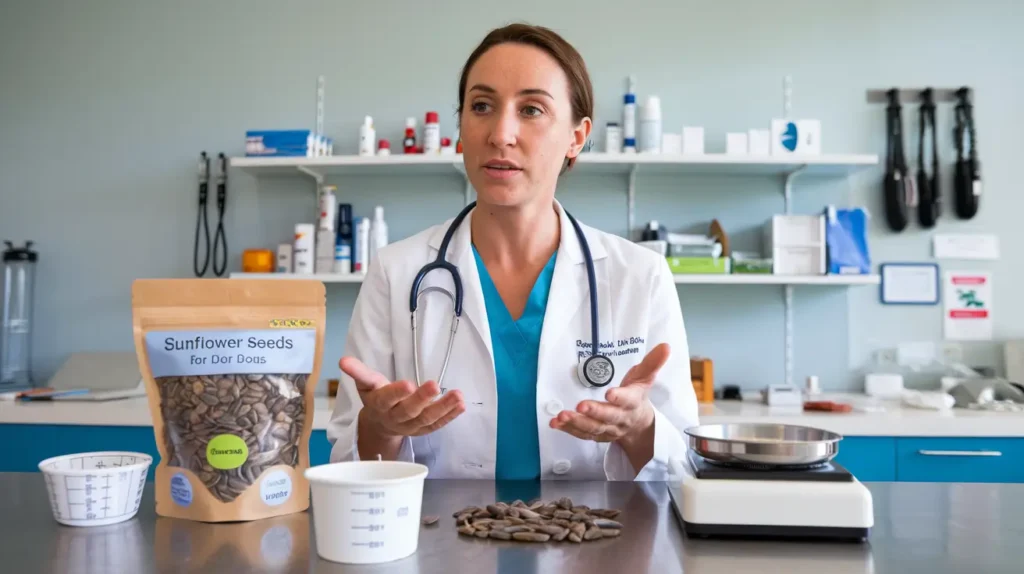
3. Magnesium
Magnesium plays a critical role in muscle and nerve function. For active dogs, sufficient magnesium helps prevent muscle cramping and fatigue after exercise, keeping them energetic and agile.
4. Selenium
This trace mineral is an unsung hero for overall health. In dogs, selenium aids in:
- Supporting thyroid function.
- Preventing oxidative damage to tissues.
- Boosting overall vitality and energy levels.
How Sunflower Seeds Compare to Other Dog Treats
While many commercial dog treats boast added vitamins and minerals, sunflower seeds provide a natural and minimally processed alternative. Here’s how they stack up:
| Nutrient | Sunflower Seeds | Processed Dog Treats |
| Vitamin E | High (natural source) | Often synthetic or fortified |
| Healthy Fats | Omega-6 fatty acids | Saturated fats or artificial oils |
| Caloric Density | Moderate (when served correctly) | Often high with unnecessary fillers |
| Digestibility | Easy (if shell-free) | Varies with preservatives |
The takeaway? Sunflower seeds, in moderation, offer a wholesome and nutrient-dense option for dogs, without the added chemicals found in many processed treats.
The Role of Sunflower Seeds in Canine Holistic Diets
For dog owners exploring holistic and natural diets, sunflower seeds can complement the inclusion of whole, unprocessed ingredients. They fit seamlessly into:
- BARF Diets (Biologically Appropriate Raw Food): Crushed sunflower seeds can be sprinkled on raw meat meals as a nutritional booster.
- Homemade Diets: Used in small amounts, sunflower seeds provide essential fats and minerals that might be missing from cooked dog food.
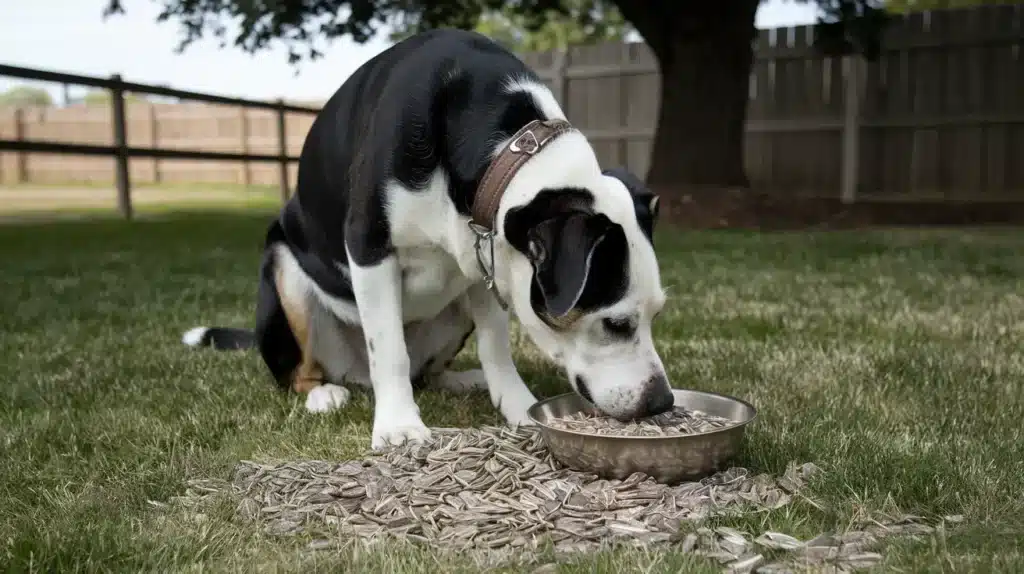
Sunflower Seeds and Sustainability in Pet Nutrition
As sustainability becomes a priority, sunflower seeds stand out as an eco-friendly option for pet treats. They are widely available, have a lower environmental footprint compared to meat-based treats, and can often be sourced locally. Choosing sunflower seeds for your dog supports responsible agriculture and reduces your household’s reliance on processed pet food.
How to Tell If Your Dog Likes Sunflower Seeds
Dogs have their preferences, and not every dog will love the taste or texture of sunflower seeds. Here’s how to gauge their interest:
- Introduce Gradually: Start with a single seed to observe your dog’s reaction.
- Watch for Positive Responses: Tail wagging, excitement, and sniffing are good signs.
- Avoid Forcing: If your dog shows disinterest, respect their choice and try other healthy treats.
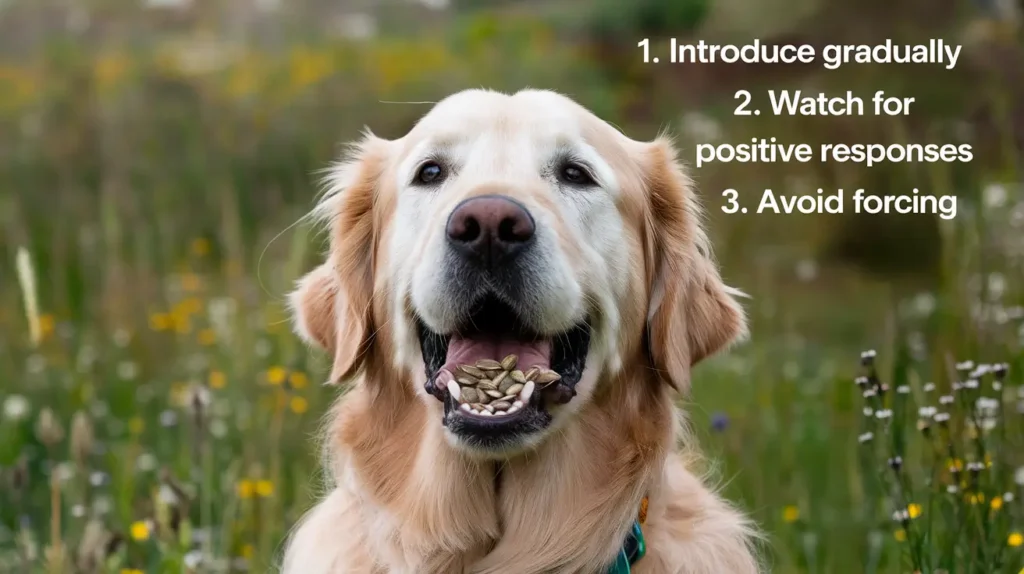
Can Dogs Eat Sunflower Seeds with Shells
No, dogs should not eat sunflower seeds with shells. The shells are tough, fibrous, and indigestible, which can pose several risks to your dog’s health. Here’s why sunflower seed shells should always be removed before offering them to your pet:
1. Risk of Gastrointestinal Blockage
Sunflower seed shells are not easily broken down in a dog’s digestive system. If consumed in large amounts, they can accumulate and potentially cause blockages in the intestines, leading to symptoms such as:
- Vomiting
- Constipation
- Lethargy
- Loss of appetite
Severe cases of blockage may require veterinary intervention, including surgery.
2. Choking Hazard
The hard, sharp edges of sunflower seed shells can become a choking hazard, especially for small dogs. Even larger breeds may struggle to chew them properly, increasing the risk of the shells getting lodged in the throat or esophagus.

3. Potential for Oral and Digestive Irritation
The abrasive nature of the shells can irritate a dog’s mouth, gums, and digestive tract. This irritation may lead to:
- Discomfort while chewing or swallowing.
- Minor cuts or injuries in the mouth.
- Digestive upset, including diarrhea or stomach pain.
4. Lack of Nutritional Value
Sunflower seed shells provide no nutritional benefit to dogs. The nutrient-rich part of the sunflower seed lies within the kernel, which is safe for dogs to eat in moderation when unsalted and plain.
The Safe Way to Serve Sunflower Seeds to Dogs
Always ensure sunflower seeds are:
- Unshelled: Remove all the shells before serving.
- Plain and Unsalted: Avoid flavored or salted sunflower seeds, as excess sodium and additives can harm your dog.
- Served in Moderation: Limit the quantity to a small treat, as sunflower seeds are high in fat and calories.
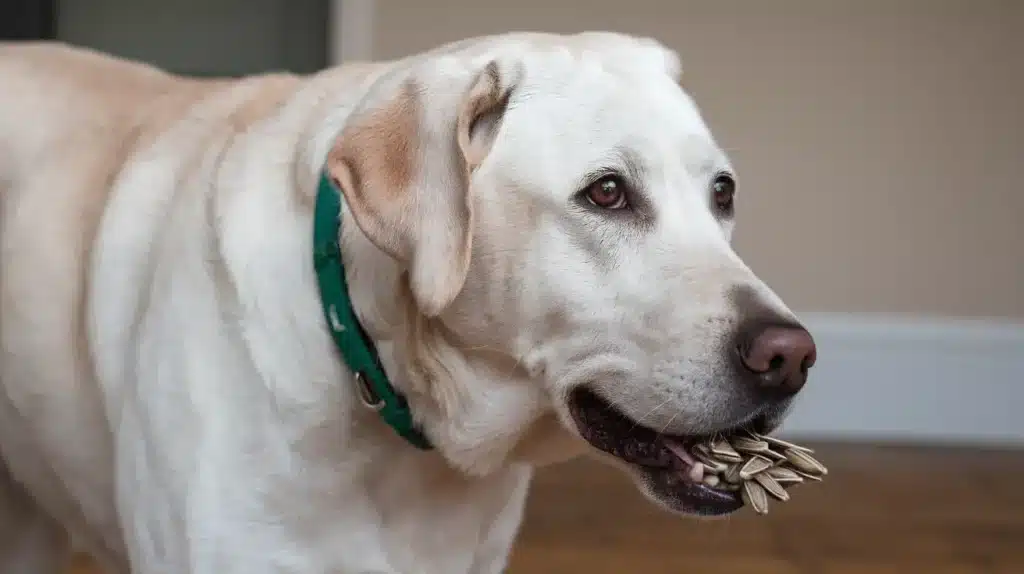
By taking these precautions, you can safely include sunflower seeds in your dog’s diet without risking their health.
Common Questions Asked Related to Can Dogs Eat Sunflower Seeds
Can Dogs Eat Sunflower Seeds and Pumpkin Seeds?
Yes, dogs can eat both sunflower seeds and pumpkin seeds, but there are important considerations:
- Sunflower Seeds: Dogs can eat sunflower seeds as long as they are unsalted, plain, and shell-free. The kernels are rich in healthy fats, vitamins, and minerals, which are beneficial for your dog’s coat and overall health.
- Pumpkin Seeds: These seeds are safe for dogs when given plain, unsalted, and roasted. They are packed with nutrients like zinc, magnesium, and antioxidants. Pumpkin seeds are also known for their potential to support urinary health and expel intestinal parasites.
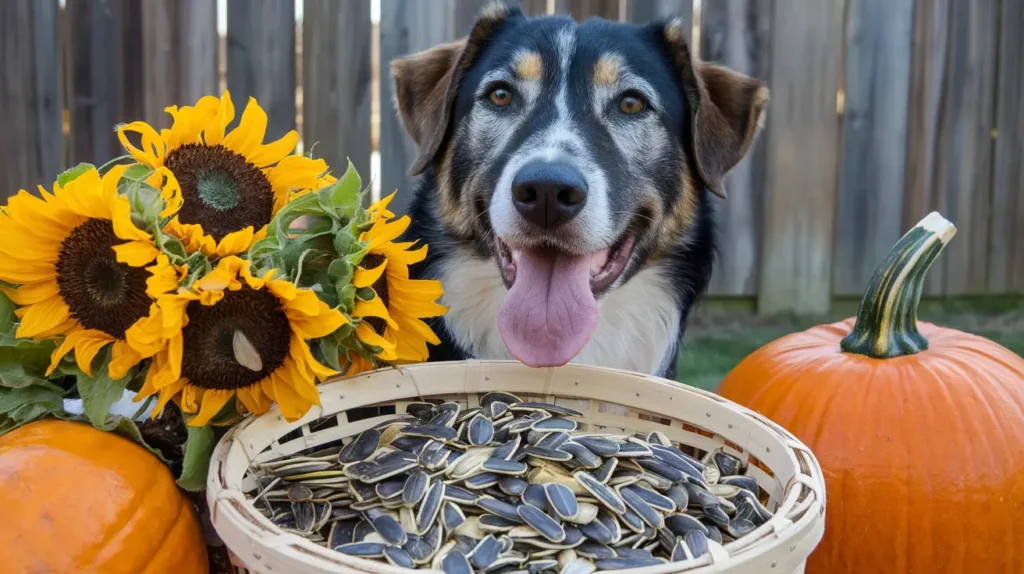
Both should be served in moderation due to their calorie content.
Can Dogs Eat Sunflower Seeds Raw?
Yes, dogs can eat raw sunflower seeds as long as they are unsalted, unseasoned, and served without their shells. The shells can pose a choking hazard and cause digestive issues, so it’s essential to remove them before offering the seeds to your dog. Always give them in moderation as a treat.
What to Do if Dog Eats Sunflower Seed Shells?
If your dog consumes sunflower seed shells, take these steps:
- Monitor for Symptoms: Watch for signs of gastrointestinal distress, such as:
- Vomiting
- Constipation
- Loss of appetite
- Lethargy
- Encourage Hydration: Provide plenty of water to help move the shells through their digestive system.
- Avoid Additional Food: Do not give more food that could complicate digestion.
- Contact Your Veterinarian: If your dog shows symptoms of a blockage or discomfort, seek professional help immediately.
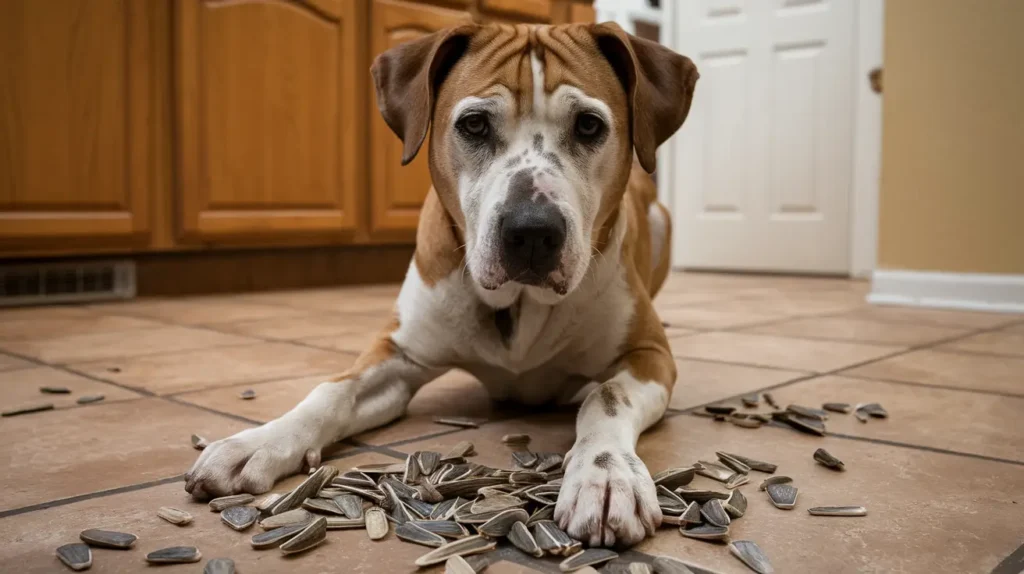
Can Dogs Eat Sunflower Oil?
Yes, sunflower oil is generally safe for dogs in small amounts. It is a good source of omega-6 fatty acids, which can promote a healthy coat and skin. However, too much sunflower oil can contribute to an imbalance between omega-6 and omega-3 fatty acids, potentially causing inflammation. Use it sparingly and consult your veterinarian before adding it to your dog’s diet.
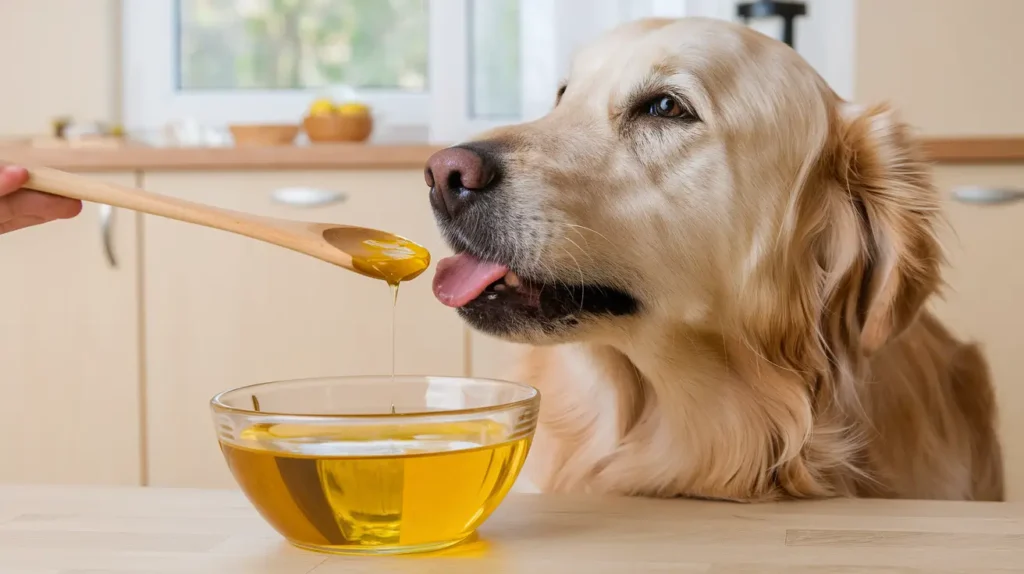
Benefits of Sunflower Oil for Dogs
Boosts Immune System
The antioxidants in sunflower oil, particularly vitamin E, can help strengthen your dog’s immune system and protect against free radicals.
Promotes Healthy Skin and Coat
Sunflower oil is rich in linoleic acid, an omega-6 fatty acid that helps maintain a shiny coat and reduces dry, itchy skin.
Supports Energy Levels
The healthy fats in sunflower oil can serve as a quick energy source for active dogs.
How to Safely Give Sunflower Oil to Dogs
- Choose High-Quality Oil
Use cold-pressed, unrefined sunflower oil for maximum nutritional benefits. Avoid oils that contain additives or are overly processed. - Use in Moderation
Sunflower oil is high in calories and fats, so it should only be given in small amounts. A good guideline is:- Small dogs: 1/4 to 1/2 teaspoon per day.
- Medium dogs: 1/2 to 1 teaspoon per day.
- Large dogs: 1 to 1.5 teaspoons per day.
Always consult your veterinarian for precise serving recommendations.
- Balance with Omega-3s
Since sunflower oil is high in omega-6 fatty acids, make sure your dog’s diet also includes sufficient omega-3 fatty acids to maintain the correct balance. Foods like fish oil, flaxseed oil, or certain fish (e.g., salmon) can provide omega-3s.
Potential Risks of Sunflower Oil for Dogs
- Weight Gain
Excessive use of sunflower oil can contribute to obesity due to its high caloric content. - Imbalance of Fatty Acids
Too much omega-6 relative to omega-3s can lead to inflammation, so careful moderation is essential. - Digestive Upset
Large amounts of oil can cause diarrhea or vomiting in some dogs. Introduce it slowly to gauge your dog’s tolerance.
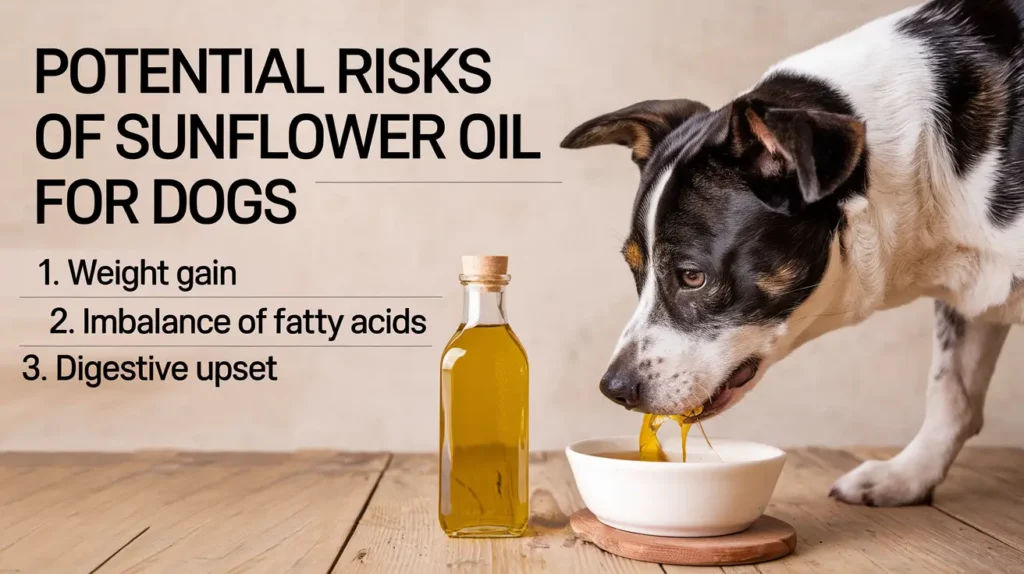
When to Avoid Sunflower Oil
Avoid giving sunflower oil to dogs with:
- Pancreatitis or other fat-related health issues.
- A history of obesity or difficulty maintaining a healthy weight.
In these cases, consult your veterinarian for alternatives.
Can Dogs Eat Seeds in Bread?
It Depends. Many types of seeds found in bread, such as sesame seeds, flaxseeds, and sunflower seeds, are generally safe for dogs in small amounts. However, avoid bread with:
- Harmful Additives: Garlic, onions, or artificial sweeteners (e.g., xylitol).
- High Sugar Content: Excess sugar can lead to weight gain and other health issues.
- Salted Seeds: These are not safe for dogs.
Additionally, bread should only be given as an occasional treat, as it has little nutritional value for dogs.
Can Dogs Eat Sunflower Seed Butter?
Yes, dogs can eat sunflower seed butter as long as it is plain, unsalted, and free of additives like xylitol, which is highly toxic to dogs. Use it as an occasional treat in small quantities due to its high fat content.
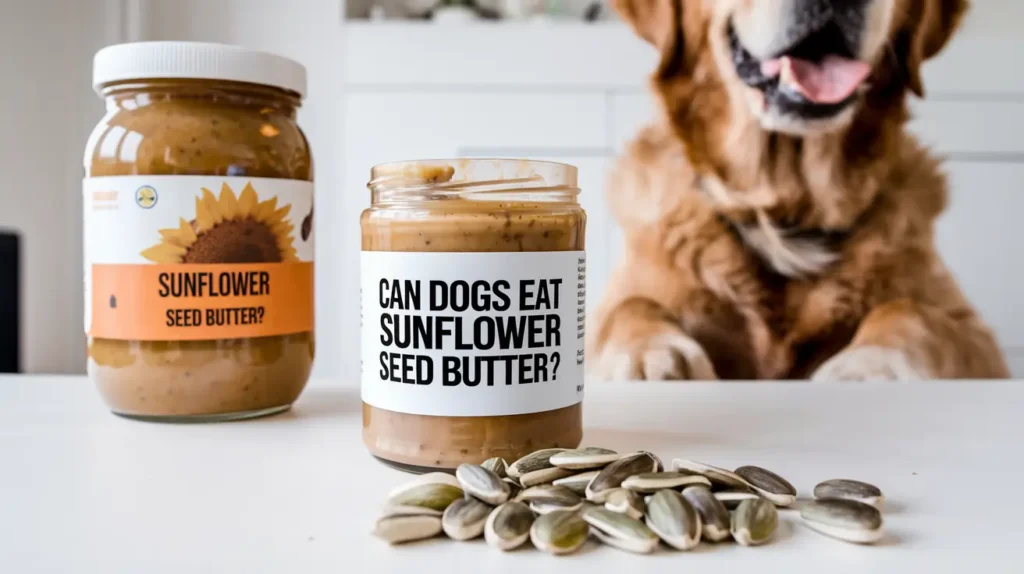
Can Dogs Eat Salted Sunflower Seeds?
No, dogs should not eat salted sunflower seeds. Excessive salt can lead to sodium ion poisoning, which may cause:
- Vomiting
- Diarrhea
- Lethargy
- Seizures
Always opt for unsalted sunflower seeds to keep your dog safe.
Final Takeaway: A Small Treat with Big Benefits
Sunflower seeds can be a safe and nutritious addition to your dog’s diet when prepared correctly and given in moderation. Always remove shells, avoid salts or additives, and consult your vet before introducing new foods.
These seeds offer a natural, healthy alternative to processed treats, providing nutritional variety while complementing a balanced diet. By feeding sunflower seeds responsibly, you can enhance your dog’s well-being—one tail wag at a time.
Frequently Asked Questions About Sunflower Seeds and Dogs
1.Can dogs eat roasted sunflower seeds?
Yes, but only if the roasted sunflower seeds are unsalted and plain. Avoid any seeds roasted with oils, seasonings, or spices, as these additives can be harmful to dogs. Stick to small portions to avoid unnecessary fat consumption.
2. Are sunflower seed butter or oil safe for dogs?
Sunflower seed butter and oil can be safe in moderation if they are free from salt, sugar, and artificial additives. However, their high fat content means they should only be used sparingly. Consult your veterinarian before incorporating them into your dog’s diet.
3. Can sunflower seeds improve my dog’s coat?
Yes, the omega-6 fatty acids in sunflower seeds can contribute to a shinier, healthier coat when included as part of a balanced diet. However, ensure your dog also receives adequate omega-3 fatty acids for optimal skin and coat health.
4. What should I do if my dog eats sunflower seed shells?
If your dog ingests sunflower seed shells, monitor them closely for signs of gastrointestinal distress, such as vomiting, diarrhea, or difficulty passing stool. Contact your veterinarian if any symptoms occur or if your dog appears uncomfortable.
5. How often can I give sunflower seeds to my dog?
Sunflower seeds should only be given occasionally, not daily. Treats of any kind should make up no more than 10% of your dog’s total caloric intake to maintain a healthy balance.
6. Do Sunflower Seeds Kill Dogs?
Sunflower seeds are not toxic to dogs and are unlikely to kill them if given in moderation and prepared correctly (unsalted, unseasoned, and without shells). However, consuming large quantities, especially with shells or added salt, can lead to serious health issues like blockages, sodium toxicity, or digestive problems. If you suspect your dog has eaten a harmful amount or is showing symptoms like vomiting or lethargy, contact your veterinarian immediately.

